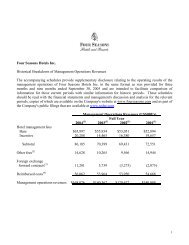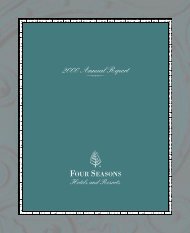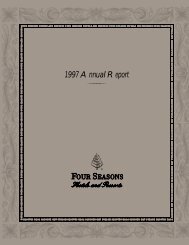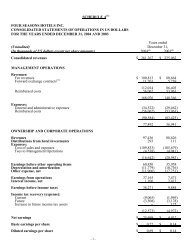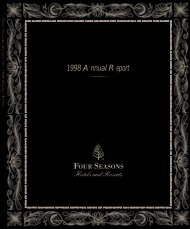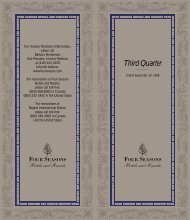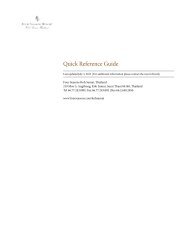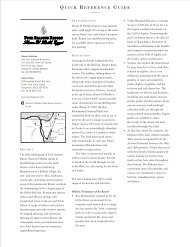1999 Annual Report - Four Seasons Hotels and Resorts
1999 Annual Report - Four Seasons Hotels and Resorts
1999 Annual Report - Four Seasons Hotels and Resorts
You also want an ePaper? Increase the reach of your titles
YUMPU automatically turns print PDFs into web optimized ePapers that Google loves.
management, including the appointment of a lead director, the practice of having non-management members of the Board<br />
meeting periodically as a group, the Board initiating discussions with senior management without the Chief Executive<br />
Officer present so that they may voice their concerns, <strong>and</strong> the ongoing monitoring of the relationship between the Board<br />
<strong>and</strong> management by the Corporate Governance Committee.<br />
Another of the Guidelines recommends that the board of directors <strong>and</strong> the chief executive officer should develop<br />
position descriptions for the board <strong>and</strong> for the chief executive officer that define the limits of management’s responsibilities.<br />
In this regard, the Corporation has taken a different approach. The Board has adopted a job description <strong>and</strong> statement<br />
of functions for the Chief Executive Officer which delegates to him the day-to-day responsibility for directing the<br />
Corporation <strong>and</strong> for meeting the corporate objectives approved by the Board. The Chief Executive Officer reports formally<br />
to the Board, as well as informally through discussions with one or more members of the Board to advise the Board on<br />
courses of action that have been taken. The Board exercises its responsibility for oversight through the approval of all<br />
significant decisions <strong>and</strong> initiatives. The Board is satisfied that the Chief Executive Officer has reported to <strong>and</strong> sought the<br />
consent of the Board where necessary <strong>and</strong> appropriate.<br />
Board Composition<br />
The Guidelines require careful consideration of the size, composition <strong>and</strong> relative independence of corporate boards.<br />
According to the Guidelines, an “unrelated” director is a director who is independent of management <strong>and</strong> is free from any<br />
interest <strong>and</strong> any business or other relationship that could, or could reasonably be perceived to, interfere materially with the<br />
director’s ability to act with a view to the best interests of the Corporation, other than interests <strong>and</strong> relationships arising<br />
from shareholding. The Guidelines emphasize the ability to exercise objective judgment, independent of management, as a<br />
hallmark of an unrelated director.<br />
Due to the death of Mr. Christopher Wallis, the retirement of Mr. John Sharpe <strong>and</strong> the appointment of Mr. Anthony<br />
Sharp to the Board during <strong>1999</strong>, the size of the Board was reduced from 14 to 13 members. The Board believes that its<br />
size promotes effectiveness <strong>and</strong> efficiency <strong>and</strong> falls within the range suggested by the Guidelines. The Board, in<br />
conjunction with the Corporate Governance Committee, has determined, after reviewing the roles <strong>and</strong> relationships<br />
particular to each of the directors, that seven of the 14 directors of FSHI who served in the <strong>1999</strong> financial year were<br />
related. The directors who are considered to be unrelated are Nan-b de Gaspé Beaubien, Charles S. Henry, Murray B.<br />
Koffler, J. Robert S. Prichard, Benjamin Swirsky, Shuichiro Tamaki <strong>and</strong> Simon Turner.<br />
While the Guidelines recommend that a corporation should be constituted with a majority of individuals who<br />
qualify as unrelated directors, the Board believes that it has <strong>and</strong> continues to function independently of management.<br />
Mr. Isadore Sharp is a “significant shareholder” (as defined in the Guidelines) of FSHI since he controls shares<br />
carrying the ability to exercise a majority of the votes for the election of the Board. The Guidelines suggest that where<br />
there is a significant shareholder, the Board should include a number of directors who do not have interests in or<br />
HOTELS AND RESORTS FOUR SEASONS HOTELS AND RESORTS FOUR SEASONS HOTELS AND RESORTS FOUR SEASONS HOTELS AND RESORTS FOUR SEASONS HOTELS AND RESORTS<br />
F our <strong>Seasons</strong> <strong>Hotels</strong> Inc.<br />
<br />
seventy-seven



